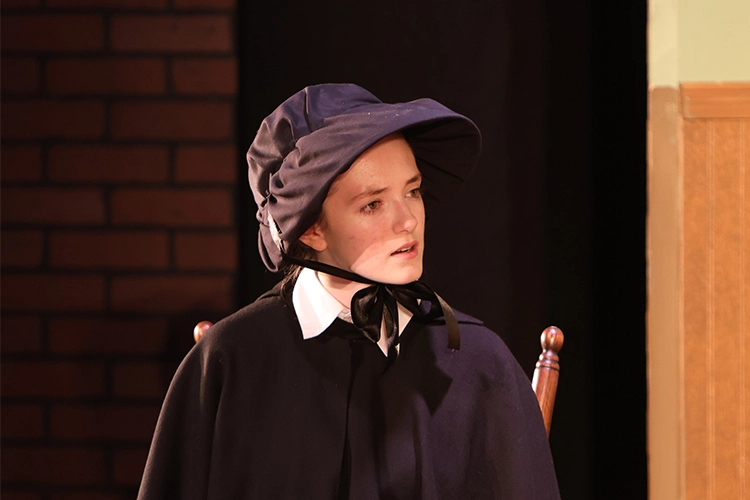CCRI Players tackle themes of doubt and uncertainty with final production of fall semester

12/12/2024
For their final act of the fall semester, the Community College of Rhode Island Players are sending audiences into the winter break scrambling to decipher context clues while wondering if perception equals reality.
Beginning Thursday, the Players launch a four-day run of John Patrick Shanley’s Doubt: A Parable, produced by CCRI Performing Arts Professor Luke Sutherland and scheduled for five performances at the college’s Providence Campus Auditorium. Showtimes are 7:30 pm Thursday through Saturday with 2 pm matinees on Saturday and Sunday. Tickets range from $5–$20 and are available online.
Written in 2004 and set in early 1960s Bronx, NY, Doubt is gripping and powerful drama that explores themes of faith, authority, and the struggle between certainty and uncertainty. The play centers around a Bronx Catholic school principal who takes matters into her own hands when she suspects a young priest of improper relations with one of their students. (See our exclusive photo gallery.)
The idea, Sutherland says, is for the audience to leave not knowing whether Father Flynn – the priest whose relationship with Donald Muller, the school’s first African-American student, has come into question – is guilty or innocent and decide themselves based on the suspicion cast by the school’s principal, Sister Aloysius, and Father Flynn’s interactions with other characters and sermons throughout the play. In Doubt’s opening act, Father Flynn delivers a sermon in which he asks his parishioners, “What do you do if you’re not sure?” setting an ominous tone for the next 90 minutes.
“I like how there are a lot of themes in there that people can relate to now,” Sutherland said, noting that aside from the obvious themes of doubt and uncertainty, Shanley’s work also explores the battles between tradition and change, power and accountability, and moral responsibility.
Sutherland also pointed out that the increased exposure of Catholic Church sexual abuse cases in the 21st century has led to a shift in audience perception while the 2008 film adaptation, Doubt, starring Meryl Streep and Philip Seymour Hoffman, “casts no doubt,” oftentimes making it difficult for audiences to view the on-stage production through an unbiased lens. He advised cast members to avoid watching modern-day adaptations of Doubt or attending Catholic masses – even for research purposes – to approach their roles without the “hindsight of understanding.” Sutherland wants the performers to feel what the audience feels.
With Doubt winning the Pulitzer Prize for Drama in 2005, this was an easy choice for Sutherland as performance pick for 2024; some of Sutherland’s most recent directorial selections feature heavy elements of religion past and present, including Hand to God in the fall of 2023, a dark comedy that touched upon themes of death, depression, and religion through the lens of a crude sock puppet. Sutherland also tends to pick award-winning plays because they tend to be well-written and challenge the thought process of both the cast and audience.
As is the case for most plays he produces at CCRI, Sutherland’s wife, Linda Sutherland, a director, theatre educator, and dramaturg at Trinity Repertory Company, compiled the cast members’ dramaturgy for Doubt, providing useful information on life before and after Vatican II – a council created in the late 1950s to address relations between the Catholic Church and the modern world and apply the truths of Christ to modern-day life – a glossary of church terms and a snapshot of life in the Bronx in 1964.
The Players’ production of Doubt stars Benjamin Card (Coventry, RI) as Father Flynn; Samantha Gromkiewicz (North Smithfield, RI) as Sister Aloysius; Sophie Bryant (Smithfield, RI) as Sister James, a young nun and teacher at the parish school; and Jocelyn Tchety (Providence, RI) as Mrs. Muller, Donald’s mother.
“A good play is one that gets people talking and thinking. Make the audience think,” Sutherland said. “When you're performing this play, you can't look at it with our lens of today. To produce this play, you have to go back to 1964. The audience will obviously look at it differently, but religion is always topical. Morality is always topical. I also think it may be fair to say that maybe younger people are questioning their faith or whether they are religious or not, so this play really takes a deeper look at these issues. It's a really solid script. It works on a lot of levels.”



